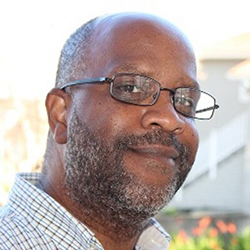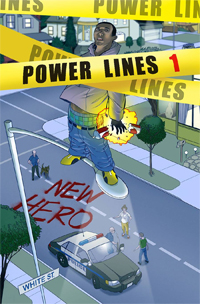Black History Month Interview: Jimmie Robinson
Jan 29, 2016
In celebration of Black History Month, PREVIEWSworld is bringing you a series of interviews with professionals from all fields in the comic industry.
Check out our interview with writer/artist Jimmie Robinson below!
 |
PREVIEWSworld: What initially got you interested in comics?
Jimmie Robinson: My mother. She knew I liked to draw and she encouraged it. When I was young, I mainly drew what I saw on TV. I would draw my favorite characters, like The Flintstones, and emulate them on paper. Then I’d draw what happened next in the TV episode on another page, then another. I was making sequential art and I didn’t even know it.
My mother worked for the railroad and one of the people she worked with also owned a comic book store. She told him about me and he often gave comics to my mother to pass along to me. He used to write notes on Post-its and put them inside the comics. “See how this is inked?” “See how this is colored?” “Notice this character?” In a way, he was my comic book angel and to this day I’ve never met the man, but thanks to that retailer I was able to direct and focus my drawing towards comic books
PREVIEWSworld: What does Black History Month mean to you?
Jimmie Robinson: It’s a time to recognize and honor the contributions from people of color in America. Not just African Americans, but all people of color – and yes, including Caucasians. Black History Month, in my view, is really about diversity. It’s a time to reflect on how we can all work together to repair the bridges between race and gender in America.
By addressing historical African-American figures we also examine the influence we have on each other – no matter what the race. Sure we have a long way to go, but it’s still early and it will still take some time for ALL sides to understand where we want to go in the future. African-Americans have been enslaved longer than they’ve been free, but I’m optimistic and happy to be born in a time where change is happening in a nonviolent way and progress can be seen from the pages of our favorite comics right up to the highest position in the White House.
PREVIEWSworld: Who’s your favorite black artist/entertainer? Why?
Jimmie Robsinson: Dwayne McDuffie. I was honored to know and speak with him on several occasions before his death. He was monumental to me as I worked to find a place for myself in the industry. He represented the potential of what diversity means for comics. He didn’t just create African-American characters, he worked for inclusion of all races and genders. From his work on DC’s Milestone comic line, to his work in animation, we have all benefited from his contribution.
Another pioneer in my life was Morrie Turner. He was the artist / writer for the newspaper strip WEE PALS. I still recall how he came to my elementary school and talked to everyone about his work. It was the first time I realized that ANYONE could work in comics. He was living proof. I was blessed to have met him as a child, then again in the year just before he passed away. I thanked him with all my heart.
PREVIEWSworld: Do you feel comics represent a wider diversity now—or do we still have a ways to go?
Jimmie Robinson: Absolutely, I think comics have done well with diversity. Is it perfect? No, but that can be said about a lot of different industries. We are not alone, but we are actively working on creating new content, hiring staff with a wider vision and reaching new audiences in more markets. That’s the type of progress we can all be proud of… not just for the sake of diversity, but also for the strength of the comic industry.
 |
PREVIEWSworld: What new projects do you have planned for the near future? What are you creating right now?
Jimmie Robinson: I have a new mini-series from Image comics in March called POWER LINES. The story focuses on a kid from the urban ghetto who discovers super powers, but his abilities only activate in a rich upscale suburb. It brings the topic of race and social economics together to create a unique discussion.
PREVIEWSworld: What advice can you offer for the aspiring comic creator?
Jimmie Robinson: I often say it’s not really that hard to break into comics, but it is hard to STAY in comics.
It also depends on what a person’s definition of “the comic industry” means, because making a comic online, print-on-demand, a Kickstarter, or self-publishing are also ways to join the comic industry. Go to any comic convention and you’ll find new independent creators with tables in artist alley and booths on the main floor right next to the huge established giants of the industry. This is a unique feature in the world of comics and it’s a way to get involved quickly. You don’t have to work for a major company to get your book into a comic store.
However, what all those avenues have in common is that the creator finished the content and had a book ready for the readers. The successful creator will not just do that once, but again and again. Successful creators stay in touch with retailers, go to conventions, make more books and do it without waiting for validation from an editor or a publisher. In other words, if you want to make a comic book, then don’t wait for permission, DO IT now. Do it often. Do it no matter what. The ability to draw and write well is appreciated, but we don’t need a one-hit-wonder. We need aspiring comic creators who can provide a wealth of content and be involved with the industry on all levels.
Read more Black History Month Interviews in PREVIEWSworld's Black History Month section!




